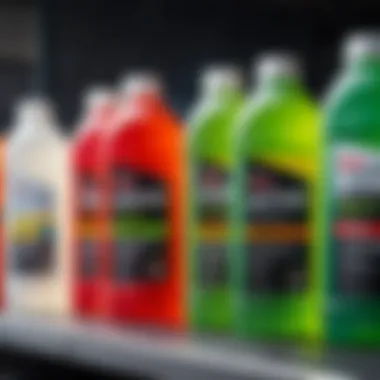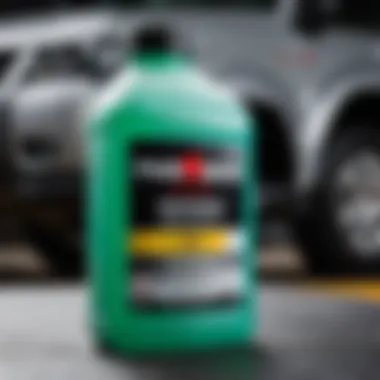Choosing the Right Antifreeze for Mitsubishi Pajero 4


Обзор автомобиля
The Mitsubishi Pajero 4 is a well-respected SUV known for its robust performance and versatility. This vehicle features excellent off-road capabilities while maintaining a comfortable ride for daily use. The Mitsubishi Pajero 4 with a 3.0-litre petrol engine is particularly noted for its power and efficiency, making it a popular choice among both enthusiasts and everyday drivers.
Основные характеристики
With a distinctive design, the Pajero 4 combines functionality with aesthetic appeal. It is equipped with ample cargo space and seating that accommodates families easily. The petrol engine, known for its smooth operation, provides sufficient torque for various driving conditions. Efficiency also plays a role in the vehicle's appeal, ensuring that it performs well both on highways and off-road.
Описание двигателей и трансмиссий
The Pajero 4 offers a 3.0-litre V6 petrol engine which delivers solid performance and reliability. This engine is paired with either a five-speed automatic or a manual transmission, providing drivers options based on their preferences. The vehicle’s four-wheel drive system enhances its handling and capability, especially in challenging terrains. Understanding the importance of using the correct antifreeze in this engine is critical for maintaining its performance and longevity.
Выбор автозапчастей
Choosing the right parts for your Mitsubishi Pajero 4 is essential for its upkeep. When it comes to antifreeze, many factors influence the decision.
Разновидности запчастей
Antifreeze comes in several varieties, each formulated for specific engine types and conditions. The two main types are:
- Ethylene Glycol: Commonly used due to its effectiveness in preventing freezing and boiling.
- Propylene Glycol: Less toxic and can be a safer option for environments with pets or wildlife.
Each type may have specific mixtures of additives to protect the engine from corrosion and maintain overall efficiency.
Как выбрать качественные запчасти
Selecting quality antifreeze is critical. Key factors to consider include:
- Manufacturer Recommendations: Always check the owner’s manual for specific antifreeze specifications that suit the Pajero 4.
- Temperature Rating: Ensure the antifreeze can withstand the climatic conditions of your region.
- Compatibility: Ensure that the antifreeze is compatible with the existing coolant in the system.
Always use antifreeze that meets the manufacturer's specifications to avoid potential engine damage.
Prolusion to Antifreeze
In this article, the topic of antifreeze takes center stage in relation to the Mitsubishi Pajero 4 with a 3.0-litre petrol engine. Antifreeze is not just a simple coolant; it serves multiple critical functions that impact the overall performance and longevity of the engine. Choosing the correct antifreeze is essential not only to prevent freezing and boiling of the coolant but also to ensure proper lubricating properties that guard against corrosion. Understanding the specific requirements and functions of antifreeze can make a significant difference in the health of the vehicle's cooling system.
Purpose and Function of Antifreeze
Antifreeze primarily acts as a heat-transfer fluid. It circulates through the engine, absorbing heat produced during combustion. This helps maintain an optimal operating temperature, preventing the engine from overheating. Additionally, antifreeze contains additives that inhibit rust and scale buildup within the cooling system. This is particularly important for the Mitsubishi Pajero 4, where the engine and cooling system must withstand various driving conditions.
Antifreeze is not only critical to temperature regulation but is also vital in protecting metallic surfaces from corrosion.
Another function of antifreeze is to lower the freezing point of the coolant. In colder climates, without antifreeze, the water in the cooling system may freeze, leading to serious engine damage. Moreover, antifreeze raises the boiling point, which is crucial for performance under high-load conditions. This balance is what allows the engine to operate effectively within a range of temperatures.
Importance in Engine Performance
The right antifreeze contributes directly to engine performance. When the engine runs at comfortable temperatures, it engages efficiently, which can lead to improved fuel economy. Conversely, using insufficient antifreeze can lead to overheating or freezing, which can severely affect engine functionality.
In the case of the Mitsubishi Pajero 4, proper antifreeze is even more vital given the vehicle's off-road capabilities and the stresses of diverse driving conditions. If antifreeze becomes degraded or is the wrong type, it can result in inadequate cooling performance, leading to overheating. This, in turn, can result in costly repairs and shortened engine life.


In summary, antifreeze is a vital component of any vehicle’s cooling system, especially for the Mitsubishi Pajero 4. Knowing its purpose, function, and importance can aid owners in making informed choices and maintaining their vehicle in optimal condition.
Overview of Mitsubishi Pajero
Understanding the Mitsubishi Pajero 4 is pivotal when selecting the right antifreeze for its 3.0-litre petrol engine. The Pajero 4, being a robust and well-regarded SUV, possesses specific characteristics that influence its cooling needs. Knowledge of these elements ensures not only optimal engine performance but also longevity of vehicle components. In this section, we will discuss the engine specifications and common issues related to the cooling system that can arise over time.
Engine Specifications
The Mitsubishi Pajero 4 is equipped with a 3.0-litre V6 petrol engine, which delivers a balance of performance and reliability. This engine typically operates with a power output close to 185 horsepower and offers a torque of about 280 Nm. Such specifications mean that the Pajero can handle a variety of driving conditions, from city commuting to off-road adventures.
To maintain this kind of performance, it is vital to choose the right antifreeze. The engine's cooling system is designed to regulate temperature effectively. A mismatch in antifreeze type can lead to overheating or inefficient cooling, which may damage engine parts. Furthermore, considering factors like engine design aids in determining the freeze and boil point of the antifreeze used.
Common Issues Related to Cooling System
The cooling system of a Mitsubishi Pajero 4 encounters several challenges over time. Overheating remains a common concern, particularly for an engine pushing the limits during demanding conditions. Other issues include:
- Corrosion of internal components: If the wrong type of antifreeze is used, it can accelerate corrosion within the cooling system, leading to premature failure of parts.
- Coolant leaks: With wear and tear, hoses can degrade, causing leaks, which ultimately affect the engine's cooling efficiency.
- Thermostat failures: The thermostat regulates the flow of coolant; a malfunction can disrupt temperature management, contributing to potential overheating.
The specifications and challenges outlined here emphasize the need to select the right antifreeze that corresponds with the Pajero’s engineering. Proper antifreeze choice not only maintains optimal cooling but also prevents costly repairs down the line.
Types of Antifreeze
Choosing the correct type of antifreeze is pivotal when maintaining the Mitsubishi Pajero 4 with a 3.0-litre petrol engine. The antifreeze plays a vital role in engine cooling as well as in preventing corrosion and deposits from forming in engine components. Understanding the different types of antifreeze can help ensure optimal performance and longevity of your vehicle's engine. Below are descriptions of the primary types of antifreeze that are relevant to your Mitsubishi Pajero 4.
Inorganic Additive Technology (IAT)
Inorganic Additive Technology, commonly known as IAT, has been in use for many years. This type of antifreeze primarily employs inorganic compounds such as phosphates, silicates, and borates to provide protection against rust and corrosion. IAT is known for its effective heat transfer properties, which is essential for keeping the engine operating at a stable temperature.
However, IAT also has some limitations. It requires more frequent changes than some newer technologies. Typically, IAT needs to be replaced every two years or 24,000 miles. If you choose IAT for your Pajero, be sure to monitor levels closely and schedule changes accordingly to prevent potential engine damage.
Organic Acid Technology (OAT)
Organic Acid Technology, or OAT, is a newer formulation that uses organic compounds instead of inorganic ones. OAT provides long-lasting protection against corrosion and scaling. One of the main advantages of OAT is its extended service life, often lasting up to five years or 150,000 miles, depending on operating conditions. This can lead to lower overall maintenance costs due to less frequent fluid changes.
OAT is compatible with most aluminum components commonly found in modern vehicles, including the Pajero 4. However, care must be taken when mixing OAT with other antifreeze types, as it can lead to reduced effectiveness. It is advised to consult the manufacturer's guidance before mixing any coolants.
Hybrid Organic Acid Technology (HOAT)
Hybrid Organic Acid Technology, or HOAT, combines both organic and inorganic additives. HOAT is designed to provide the benefits of both IAT and OAT, making it a versatile choice for many vehicles, including the Mitsubishi Pajero 4. The inorganic additives offer superior corrosion protection, while the organic components extend fluid life.
Depending on formulation, HOAT antifreeze may last up to five years or more, similar to OAT. This can be beneficial for owners looking to lower maintenance efforts while still ensuring optimal protection. However, similar to OAT, it is crucial to avoid mixing HOAT with other antifreeze types to maintain its efficacy.
Final Note: Understanding these three types of antifreeze allows you to make an informed decision that suits your driving conditions and maintenance preferences. Always refer to the Mitsubishi Pajero 4 owner's manual for specific recommendations.
Specific Antifreeze Requirements for Pajero
When selecting antifreeze for the Mitsubishi Pajero 4, it is crucial to follow the specific requirements laid out by the manufacturer. This ensures the engine operates efficiently and prevents serious issues. The right antifreeze not only aids in cooling but also protects against corrosion. Keeping the engine temperature regulated supports optimal performance. Not adhering to the specified requirements can result in long-term damage to the engine, leading to costly repairs.
Manufacturer Recommendations
The manufacturer's recommendations are the guiding principles for antifreeze selection. Mitsubishi clearly outlines that Pajero 4 models with a 3.0-litre petrol engine require a specific type of antifreeze. According to Mitsubishi's guidelines, using a high-quality ethylene glycol-based coolant that meets the JIS K 2234 standard is critical. This type of antifreeze has additives that protect against rust and corrosion, which is essential given the diverse climates these vehicles may face.


It's imperative to use either the OEM antifreeze or one that matches the recommended specifications. Using a poorly formulated product can compromise cooling efficiency. The recommendations directly relate to how the engine and cooling system interact, making compliance necessary for longevity and performance.
Compatibility with Engine Materials
Compatibility with engine materials is another vital aspect when choosing antifreeze for the Pajero 4. This particular vehicle contains different types of metals and materials in its engine construction. The antifreeze must be non-corrosive and compatible with these materials to prevent degradation over time.
Common materials include aluminum and brass, both of which can react negatively with certain antifreeze formulations. For instance, solutions that do not have the right inhibitors may cause pitting corrosion on aluminum parts. This, in turn, leads to leaks and increased wear on components.
Regularly checking the composition of the antifreeze can save time and money in the long run. If an antifreeze is not compatible, it can lead to significant maintenance issues. Thus, when purchasing antifreeze for the Pajero 4, confirming material compatibility is not optional but a necessity.
Factors Influencing Antifreeze Selection
Selecting the right antifreeze for the Mitsubishi Pajero 4 with a 3.0-litre petrol engine involves several crucial factors. Understanding these elements ensures optimal engine performance and longevity. Vehicle owners must consider environmental conditions, driving habits, and financial implications related to antifreeze choices. Each factor plays a role in maintaining the vehicle's cooling system and overall engine health.
Climate Considerations
Climate significantly affects antifreeze performance. In regions with extreme temperatures, antifreeze must provide protection against freezing and boiling. For cold climates, a higher concentration of antifreeze is necessary. This prevents the coolant from freezing and causing potential damage to the engine. In contrast, warmer climates may require a more diluted antifreeze solution. Thus, it is important to check local weather patterns to determine the appropriate antifreeze mix for your Pajero 4. Look for antifreezes that offer excellent temperature stability.
Driving Conditions and Usage
How the vehicle is driven influences the antifreeze selection process as well. If the Pajero 4 is frequently driven in stop-and-go traffic, under heavy loads, or in off-road conditions, it experiences different cooling demands. Under these circumstances, an antifreeze with enhanced protective properties is essential. This ensures it can withstand stress and maintain proper engine temperature. Understanding individual driving habits helps in making a better choice for antifreeze that can cope with the demands of your driving environment.
Cost vs. Quality Analysis
When choosing antifreeze, balancing cost and quality is vital. Cheaper antifreezes might seem appealing, but they can lack essential protective additives. This raises the risk of engine wear, corrosion, and cooling inefficiencies. Investing in high-quality antifreeze designed for aircraft antifreeze systems may save money over time, reducing potential repair costs. It is worth considering the long-term effects rather than focusing solely on short-term expenses. Select antifreezes that meet industry standards and have been positively reviewed for use in Mitsubishi Pajero engines.
"Choosing the right antifreeze can be the difference between prolonged engine life and costly repairs."
By reflecting on these factors, vehicle owners can ensure they choose the most suitable antifreeze for their Mitsubishi Pajero 4, ultimately promoting the health and performance of the vehicle.
Risks of Using Incorrect Antifreeze
Using the wrong type of antifreeze in a Mitsubishi Pajero 4 can lead to significant complications. These complications may not only affect the immediate performance of the vehicle but can also have long-lasting impacts on the engine's overall health. Understanding the risks associated with incorrect antifreeze usage is crucial for maintaining your vehicle's performance and longevity.
Potential Damage to the Engine
One of the most severe risks of incorrect antifreeze is the potential damage to the engine. Each type of antifreeze is formulated with specific additives meant to protect certain engine materials and to perform under specific thermal conditions. For instance, using an antifreeze not compatible with aluminium components may lead to corrosion and overheating. This can result in a breakdown of engine parts, which will necessitate expensive repairs. Metal components can develop pitting due to chemical reactions, leading to leaks and operational failures.
Engines operate at high temperatures, and antifreeze helps regulate these temperatures. If the antifreeze does not have the correct properties, it may fail to adequately transfer heat away from the engine. Over time, this can cause overheating, which exacerbates wear and tear, leading to blown head gaskets or even complete engine failure.
Impact on Cooling System Efficiency
The cooling system is fundamental to the operation of any vehicle. It ensures the engine remains within the optimal temperature range. Incorrect antifreeze can severely hinder the efficiency of this system. One of the primary functions of antifreeze is to raise the boiling point and lower the freezing point of the coolant fluid. If the antifreeze used does not perform its function correctly,
- Boiling over can occur during hot conditions, leading to possible engine damage.
- Freezing in cold weather can cause blockages and prevent the engine from reaching necessary temperatures.
Additionally, wrong antifreeze may form deposits and sludge, which hinders fluid flow through the radiator and hoses. This not only decreases overall cooling efficiency but can also lead to premature wear of water pumps and other cooling system components. Regularly monitoring antifreeze conditions will help in identifying any degradation or compatibility issues before they escalate into costly repairs.
Incorrect antifreeze can damage engine components, lead to overheating, and significantly reduce cooling efficiency, causing long-term issues.
Making the right choice for antifreeze is essential in maintaining the Mitsubishi Pajero 4's performance and enhancing the durability of its engine and cooling system. As such, understanding these risks can lead to better decision-making when it comes to vehicle maintenance. Proper antifreeze selection can ultimately safeguard your investment and ensure reliable operation.


Testing and Monitoring Antifreeze Levels
Testing and monitoring antifreeze levels is essential for maintaining the health of the Mitsubishi Pajero 4's engine. Proper antifreeze levels ensure the cooling system operates efficiently, preventing overheating and potential engine failure. Regular checks can identify issues before they escalate, saving time and costly repairs.
Monitoring antifreeze levels also involves understanding the impact of various factors like climate and driving conditions on cooling effectiveness. For instance, extreme temperatures can affect antifreeze concentration. Therefore, consistent testing can help to ensure the correct ratio for optimal performance.
Routine Maintenance Checks
Routine maintenance checks of antifreeze levels should be part of a regular service schedule. It often includes checking the coolant reservoir and radiator. It is recommended to check these at least once a month or before long trips.
The process for checking antifreeze levels can be simple:
- Visual Inspection: First, observe the coolant level in the reservoir. If it is below the minimum mark, it is necessary to add more.
- Color Check: The color of the antifreeze should be bright and clear. If it appears cloudy or rusty, it may be time to change it.
- Quality Test: Using a hydrometer or refractometer can determine the freezing and boiling points of the antifreeze. This helps ensure it has not degraded.
Regular maintenance not only protects the engine but also enhances its performance and longevity.
Signs of Antifreeze Degradation
Recognizing the signs of antifreeze degradation is crucial for timely intervention. Degraded antifreeze can cause numerous problems, including corrosion of engine components and decreased efficiency of the cooling system.
Some signs to look for include:
- Color Change: As mentioned, a change in color from bright green, orange, or pink to a dull hue indicates degradation.
- Presence of Sediment: Rusty flakes or sediment in the reservoir can signal corrosion inside the cooling system.
- Odors: A sweet smell coming from the coolant reservoir may indicate leaks or degradation.
- Boiling Over: If antifreeze boils over or the engine overheats, it could be a sign of low antifreeze levels or degraded antifreeze.
Expert Recommendations and Insights
When selecting antifreeze for the Mitsubishi Pajero 4 with a 3.0-litre petrol engine, expert recommendations hold significant value. These insights stem from extensive experience and knowledge within the automotive industry. Professionals, such as automotive specialists and mechanics, provide guidance based on scientific principles, industry standards, and practical experiences. Their advice can enhance engine performance, extend lifespan, and prevent costly repairs.
Automotive experts emphasize the importance of adhering to the manufacturer's specifications. Using the right type of antifreeze is crucial as it directly affects the cooling system's efficiency and the engine's overall performance. For instance, Mitsubishi suggests certain formulations that meet their rigorous testing standards. Deviating from these recommendations can lead to various issues, including overheating, corrosion, and even engine failure.
Additionally, experts advocate for considering environmental factors when choosing antifreeze. For example, regions with extreme temperatures may require specific types of antifreeze that offer better protection against freezing and boiling points.
"Always refer to your vehicle’s manual and formal guidance from manufacturers when selecting antifreeze. This practice ensures optimal compatibility and performance."
Advice from Automotive Specialists
Automotive specialists advise on several key aspects when choosing antifreeze:
- Compatibility: Ensure the selected antifreeze is compatible with the engine materials, such as aluminum and rubber seals. Mismatched products can lead to leaks and increased wear.
- Type of Antifreeze: Prefer organic acid technology-based antifreeze for long-lasting properties. These formulations tend to last longer and offer better protection against corrosion compared to traditional types.
- Testing Regularly: Regular checks of antifreeze levels help catch degradation or contamination early, preventing larger issues down the line.
Common Misconceptions About Antifreeze
There are several misconceptions surrounding antifreeze, which can lead to poor vehicle maintenance decisions:
- All Antifreeze is the Same: This is inaccurate. Different vehicles require specific types based on their design. Choosing the wrong antifreeze can lead to severe engine damage.
- Cost Equals Quality: Some may believe that a higher price guarantees superior quality. While this is often true, it does not account for various factors such as the specific needs of the vehicle.
- Antifreeze Never Expires: Many enthusiasts think antifreeze lasts indefinitely. In reality, it can degrade and lose its effectiveness over time. Regular testing and replacement is necessary.
Closure
In any discussion regarding vehicle maintenance, the significance of choosing the right antifreeze cannot be overstated. This article has explored various facets of antifreeze selection specifically for the Mitsubishi Pajero 4 equipped with a 3.0-litre petrol engine. Making an informed choice impacts not just the performance of the vehicle but can also have long-lasting effects on engine reliability and longevity.
Recap of Key Points
- Understanding Antifreeze: We discussed its purpose, including protection against freezing and boiling.
- Types of Antifreeze: Insights were provided on Inorganic Additive Technology, Organic Acid Technology, and Hybrid Organic Acid Technology.
- Pajero 4 Specifications: Knowing what the manufacturer recommends is key to compatibility and performance.
- Environmental Factors: We examined how climate, driving conditions, and budget influence antifreeze selection.
- Risks: The potential dangers of using incorrect antifreeze were underscored, showing that the wrong choice can lead to significant engine damage.
- Maintenance: The importance of regular checks and monitoring antifreeze levels was highlighted as vital for ongoing performance and safety.
Final Thoughts on Antifreeze Selection
Selecting antifreeze is not a trivial matter; it demands attention to detail, understanding, and awareness of specific vehicle needs. Automotive enthusiasts, mechanics, and professionals should take this article’s insights seriously. The blend of technical knowledge and practical advice aims to empower Pajero 4 owners in their decision-making. Ultimately, choosing the right antifreeze can significantly enhance engine function and reduce long-term maintenance costs. The right products lead to a smoother and safer driving experience.







